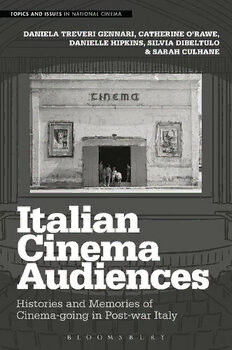
Italian Cinema Audiences: Histories and Memories of Cinemagoing in Post-War Italy PDF
237 Pages·2021·16.265 MB·English
Most books are stored in the elastic cloud where traffic is expensive. For this reason, we have a limit on daily download.
Preview Italian Cinema Audiences: Histories and Memories of Cinemagoing in Post-War Italy
Description:
In 1988 Giuseppe Tornatore’s film Nuovo Cinema Paradiso (Cinema Paradiso, Italy) achieved global success with a story that placed Italian cinema audiences at the centre of its narrative. In it, spectators are portrayed attending cinemas, bonding with the stories they saw on the screen and interacting loudly with films such as Visconti’s neorealist classic La terra trema (The Earth Trembles, Italy, 1948), Raffaello Matarazzo’s enormously popular melodrama Catene (Chains, Italy, 1949) and Mario Mattoli’s comedy I pompieri di Viggiù (The Firemen of Viggiù, Italy, 1949). This representation of post-war film culture demonstrates vividly both the affective charge of Italian cinema, at its peak of popularity, and its role in the social fabric of daily life.
See more
The list of books you might like
Most books are stored in the elastic cloud where traffic is expensive. For this reason, we have a limit on daily download.
